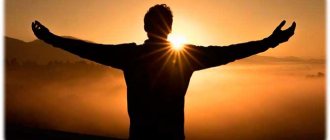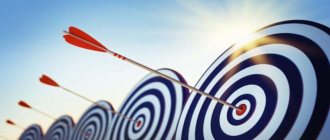Greetings, dear readers!
I will begin this article with a phrase that Socrates emphasized: “Know thyself.” In Aristotle’s lost dialogue “On Philosophy,” it was reported that this inscription, read by him in the Delphic temple, served as an impetus for Socrates’ philosophical studies.
I believe that the main tragedy of man in our time is ignorance of God. In past centuries there was no separation between philosophy and religion, science and faith. But now, according to the view of “enlightened humanism,” only science represents the progress of humanity and the triumph of the human mind in the knowledge and transformation of nature.
The more science develops, the less space there is left on earth for God, the higher the level of education of a person, the less likely it is that he will believe in the Lord Jesus Christ.
Belief in God, who controls the universe and every detail of people's lives, belief in the continuation of the life of the soul after death, belief in the truth of the Bible - all this is perceived as signs of human backwardness and lack of education.
And the tragedy of people lies not only in the fact that they did not know the living God. But also that they do not know themselves. And this is the result of human apostasy from his Creator.
Almost all of our wisdom - in any case, deserving the name of true and complete wisdom - is divided into two parts: knowledge about God and the knowledge about ourselves gained through him. Both of these types of knowledge are connected to each other by so many connections that it is not always easy to distinguish which of them precedes the other and gives rise to it.
John Calvin
In order for a person to know himself, he simply needs to come to God. Of course, a person can learn a lot of information about himself from other sources: self-awareness, other people and the world around him. But “Homo sapiens” will not be able to know their true essence and purpose in this world without God. And the deep meaning will flow through your fingers like water, and the person will be left with nothing.
What does self-knowledge mean?
Self-knowledge is understanding oneself, studying one’s psychological, biological, social and spiritual characteristics.
Self-knowledge begins in infancy, when the child begins to recognize himself as an individual person, and continues throughout our lives.
In simple terms, a person’s knowledge of himself is the study of:
- your strengths and weaknesses;
- fears;
- desires;
- interests;
- attachments;
- inclinations;
- hopes;
- ability to communicate;
- attitudes towards life and people;
- values;
- attitude towards criticism;
- life satisfaction, etc.
Structure
Self-knowledge consists of several elements:
- The image of "I" . May also appear under the name "Ego". The definition includes a person's relationship to himself and his dominant ways/strategies/ways of interacting with others.
- Self-control . This is the subordination of one’s own behavior, state and actions to the standard accepted in society (through the volitional component).
- Self-esteem . A range of feelings towards oneself, which are reflected in an intermediate meaning between the polar categories of “acceptance” and “non-acceptance”.
Why is it so difficult to know yourself?
There are several reasons:
- Lack of time. We live at a frantic pace, rack our brains over how to combine work and family, chase earnings, experience stress and have trouble sleeping. In this way of life, the idea of self-knowledge seems sheer nonsense. In our daily time pressure, we sometimes have no time to sit in silence and drink a cup of tea. What kind of knowledge can we talk about there? By the way, I recommend reading our article on how to deal with stress, and also familiarize yourself with a selection of books to improve the quality of your sleep.
- Focus on the external. We are more in need of external success, promotion, status, influence, material goods and underestimate the importance of satisfying our internal hunger. However, achieving success is very closely related to self-analysis. If you don't pay attention to what's inside, you can get devastated even when you reach decent heights.
- Reluctance to face the truth. We all sometimes commit unpleasant acts, utter hurtful words, and behave unworthily. If you start delving into your personality, you can find a lot of negative things there. Who likes to learn this about themselves? It’s much easier not to notice and not interfere with the comfortable perception of your loved one. Otherwise, we will have to change something and destroy the world to which we are so accustomed.
- Lack of awareness of actions. We do many things in our lives unconsciously. Since it is difficult for the brain to concentrate on all the actions in each moment, all the feelings and emotions, it takes the path of least resistance and turns on autopilot.
- Identifying yourself with your thoughts. Possessing pronounced critical thinking, a person forgets that he is a combination of mind, feelings and body. With such a limited way of exploring oneself, it is extremely difficult to achieve self-knowledge.
- Guide only by feelings. This assumes the opposite situation to the previous point, when a person follows momentary feelings, not taking into account the fact that the assessment of reality can be distorted due to various factors.
Examples from history
Vivid examples of how self-knowledge acts as an engine of spiritual, cultural, scientific and technological progress can be found in history.
For example, the yoga principle of Ahimsa or non-violence is the fruit of spiritual quest, self-knowledge and the search for truth within oneself.
This principle implies the rejection of cruelty and eating animal food as a form of cruelty. This concept of behavior was developed by followers of yoga and was born through self-knowledge.
What does a lack of self-knowledge lead to?
According to British author and best-selling English-language novelist Alain De Botton, “a lack of self-knowledge leaves us open to chance and misguided ambition.”
More than 100 cool lessons, tests and exercises for brain development
Start developing
What else does a lack of self-knowledge entail:
- Low self-esteem and anxiety. If a person does not have a clear idea of what he is, what advantages he has and what kind of potential lies within him, when assessing himself he will be guided by the opinions of others, and as we know, they are not always flattering.
- Difficult relationships with others. We are talking about both personal life, relationships with loved ones, and social connections with colleagues, friends, and outsiders. A person who does not know what he loves and what he wants will invariably enter into toxic relationships, endure other people's complaints, rudeness, neglect and other negativity.
- Least favorite job. When choosing a profession, we are often guided by the wishes of our parents or social recognition. A person who knows and values himself and his time will strive to find something he enjoys that promotes development and success. You can read how to find your purpose in our separate publication.
- Throwing money down the drain. In this case, finances are wasted on things that do not bring true pleasure, but are purchased for the sake of fashion. And so every time. Moreover, not only money is spent in this way, but also time.
Attribution
The Greek aphorism is attributed to at least the following by the ancient Greek sages:
- Priene's Bias[6]
- Chilon of Sparta[7]
- Cleobulus of Lindus[8]
- Heraclitus[9]
- Mayson from Chene[10]
- Periander[11]
- Pittacus from Mytilene[12]
- Pythagoras[13]
- Plato[14]
- Solon of Athens[15]
- Thales of Miletus[16]
Diogenes Laërtius attributes this to Thales ( Life
I.40), but also notes that Antisthenes, in his
Successors of the Philosophers,
attributes it to Phemonoe, the mythical Greek poet, although he admits that it was appropriated by Chilo.
Discussing moderation and self-consciousness, the Roman poet Juvenal quotes a phrase in Greek and states that the commandment came down e caelo
(from paradise) (
Satires
11.27).
The 10th century Byzantine Encyclopedia Suda
recognized Chilon[17] and Thales[18] as the sources of the saying "Know thyself".
The authenticity of all such attributions is doubtful; according to Park and Wormell (1956), “the actual authorship of the three sayings inscribed on the Delphic Temple may be left unclear. Most likely, these were popular proverbs that were later generally attributed to certain sages."[19][20]
What does self-knowledge give?
What does a person look like who is not afraid to get to know himself and look at his personality soberly and honestly:
- He does not shift responsibility for his failures in relationships and career onto other people, but tries to understand the situation and solve it in the most environmentally friendly way.
- He has healthy self-esteem, which allows him not to become discouraged when faced with criticism, competition, loss, etc.
- He becomes more aware, uses autopilot less and begins to notice the smallest changes.
- He stops blaming himself and others for his bad mood.
- He treats money adequately: he does not waste it, but directs it to what is really important to him.
- He gets used to hearing and listening to himself, his body, and resting when it is truly necessary. Such a person treats himself with care, love and understanding.
- Sensitivity to the world and the people around you awakens, mutual understanding grows.
- He is able to make positive changes in his life because he understands how people hold themselves back and for what reasons.
- When making a choice, he relies only on himself.
- A person understands his uniqueness and the possession of an exceptional set of qualities necessary for development.
- Becomes more harmonious and happy.
Functions
To summarize, the basic functions of self-knowledge can be called introspection and introspection . In addition, when considering the issue in detail, the functions of the process of self-knowledge include:
- Understanding yourself (working with detailed knowledge about yourself).
- Increasing personal significance (choosing positive knowledge about yourself and working with it).
- Self-test (comparing your own knowledge about yourself with the assessments of others).
Ways to know yourself
Let's move from theory to practice and find out with what methods and tools you can dive deeper into your personality, get to know yourself better and find harmony.
1. Slowdown
It is logical that with our rhythm of life it is extremely difficult to engage in self-knowledge. Start by slowing down and taking time for yourself. There are 24 hours in a day and, believe me, if you use them wisely, you can find time for anything.
I recommend reading about time management techniques that will help you manage your life more productively.
The right questions
Two main questions that are important to regularly ask yourself:
- What's going on in my life right now?
- How okay am I with this?
It is better to record the answers that pop up in your head on paper point by point. For a more comprehensive understanding, it is better to take several areas of life at once and go through each of them. Ask yourself: “What is happening now with my personal life, professional fulfillment, health, finances, creative self-expression?”
If distortions that create discomfort have been identified in some areas, you should move to the next stage and find out the reasons, possible methods of correction, or even the validity of personal claims to this or that area of life.
What other questions will help you get to know yourself better:
- How am I feeling at the moment?
- Who am I? Who do I consider myself to be, what place do I occupy in society, at work, in the family?
- What is my life goal and values, where am I going?
- Do I have any grudges against my parents and if so, what is the reason?
- What kind of people do I like and dislike?
- What actions and achievements am I proud of?
- In what situations did I act incorrectly and could this have been avoided?
- What things in life do I consider the most important? How much time do I devote to them?
- What purchases do I often make based on advertising or trends that end up not making me happy?
- What addictions are dragging me down? Am I ready to correct them?
- What negative traits of my character would I not want to demonstrate to people dear to me and those around me?
- What's making me jealous lately?
- What prevents me from making decisions and making my life better?
Even more questions that reveal your personality can be found in self-discovery tests.
Self-observation and self-analysis
Simply observing your behavior, internal sensations, emotions, reactions to certain words and events will help you get to know yourself. Such observation must certainly be followed by self-analysis, which will help confirm or refute your own conclusions, find out the reasons and think about improving the situation.
Let me give you an example. Observing himself, a person realizes that he is overly shy. Through introspection, it is possible to confirm this fact: it can be difficult to get comfortable in the company of strangers, it is difficult to express your point of view, there is a desire to remain silent, sit out, when you try to say something, your throat dries up, your face turns red.
After this, an assessment is made: whether attacks of embarrassment always occur or only in specific situations and under certain conditions. Next, the person looks for ways to cope with his shyness, performs various techniques, practices, signs up for trainings, etc.
By the way, I advise you to read our article on how to get rid of complexes.
Mindfulness
Control over one's actions, thoughts and feelings makes a person truly the master of his destiny.
The Indian philosopher Osho in his book “Mindfulness” described the practice of being in the “here and now” state. He believes that the most important skill to learn is observation. Here are the recommendations he gives:
- Watch every action you take, every thought that passes through your mind, every desire that comes over you.
- Watch what and how you say, what gestures you use, how you walk and even brush your teeth and take a bath.
- Do not eat mechanically, stuffing your mouth with food, chew with observation, with feeling. Otherwise, even the most delicious food will seem bland and will not bring satisfaction.
- Watch. This way you will understand how much you have missed so far.
Psychological work
It consists of reading books on psychology and socionics, passing psychological tests, identifying one’s own psychotype, chronotype, etc.
There are many classifications of human personality types: according to Holland, according to Jung, according to temperament, perception, etc.
Here, for example, is what the socionic division of personality types looks like (see picture below).
Application of various techniques
I will give an example of the simplest and safest technique of self-knowledge, which is based on art therapy and psychological work with subpersonalities.
The practice takes place in two stages:
- Thoughtful. Close your eyes and imagine yourself in the future. The term can be any – 1 month, 5–10 years. Pay attention to how you look, what you have, what you don’t have, whether you are happy, how you feel, what you do, who you live with, who you are close to, etc.
- Expression in a drawing. Now transfer the presented image onto paper. Don't chase technique. The main thing is to be creative, choose colors and shapes.
The point of this technique is to correlate the image that was created in the imagination with what is now in reality. This will give you the opportunity to understand what is in the future and what is missing at the moment, what you would like to get or, conversely, what to get rid of.
If the future seems vague and uncomfortable, it is worth thinking about the psychological blocks that, even at the level of imagination, do not allow you to see yourself as joyful and harmonious. In this case, the block can also be represented in the form of a drawing, thinking about what color, size, shape it might have, what it looks like, what it serves, etc.
You might be interested in reading about how to get out of depression.
Esoteric systems
Anyone who does not consider himself an inveterate skeptic can use various esoteric tools that allow him to look deeper into his inner world. These include:
- astrology;
- human design (Human Design);
- tarot cards;
- numerology;
- meditation;
- yoga;
- qigong;
- space energy;
- Reiki energy;
- channeling.
There are actually a lot of such techniques. At the same time, it is not at all necessary to rush to extremes and begin to comprehend everything at once. There may be something for everyone. For example, I have been doing yoga with a trainer for several years, I like meditation, and I am also interested in numerology, Tarot and Human Design. Perhaps you too can reveal new facets of your personality with the help of one of these tools.
I recommend taking spiritual development courses. You will get to know yourself better, unlock your potential and be able to achieve inner harmony.
References
- Pausanias, Description of Greece, Paus. 10.24.
- Plato Charmides
165 - "Nosce te ipsum - definition and more from the free Merriam-Webster dictionary." Merriam-webster.com. 2010-08-13. Retrieved March 16, 2011.
- "AllExperts.com: temet nosce." allexperts.com. Archived from the original on December 31, 2011. Retrieved February 17, 2013.
- Eliza J. Wilkins, ΕΓΓΥΑ, ΠΑΡΑ ΔΑΤΗ in Literature
Classical Philology Vol. 22, No. 2 (April 1927), page 135 https://www.jstor.org/stable/pdf/263511.pdf?seq=15 - Bias Priene In Plato's Protagoras (343a-343b), Socrates lists bias as one of the seven sources of the Delphic maxims, including "Know thyself." https://www.perseus.tufts.edu/hopper/text?doc=Perseus:text:1999.01.0178:text%3DProt.:section%3D343a>
- Chilo of Sparta, 10th-century Byzantine scholia in Suda
attributed the aphorism to Chilo.
"Know yourself." Suda
Online. Tr. Catherine Roth. August 13, 2002. February 15, 2011. https://www.stoa.org/sol-entries/gamma/333>. - Cleobulus of Lindus in Plato's Protagoras (343a-343b) Socrates lists Cleobulus as one of the seven sages who were the sources of the Delphic maxims, including "Know thyself." https://www.perseus.tufts.edu/hopper/text?doc=Perseus:text:1999.01.0178:text%3DProt.:section%3D343a>.
- Doctoral dissertation, "Know Thyself in Greek and Latin Literature," Eliza G. Wilkens, W. Chi, 1917, p. 12 (online).
- Maison from Plato's Chenev "Protagoras" (343a-343b) Socrates lists Maison as one of the seven sages who were the sources of the Delphic maxims, including "Know thyself." https://www.perseus.tufts.edu/hopper/text?doc=Perseus:text:1999.01.0178:text%3DProt.:section%3D343a>.
- Pausanias 10.24.1 mentions a dispute over whether Periander should be considered the seventh sage instead of Maison. But Socrates, whom Pausanias cites as a source, supports Maison. Paus. 10.24
- Pittacus of MytileneIn Plato's Protagoras (343a-343b) Socrates lists Pittacus as one of the seven sages who were the sources of the Delphic maxims, including "Know thyself." https://www.perseus.tufts.edu/hopper/text?doc=Perseus:text:1999.01.0178:text%3DProt.:section%3D343a>.
- Vico, Giambattista; Visconti, Gian Galeazzo (1993). On Humanistic Education: (Six Inaugural Addresses, 1699-1707)
. Six Inaugural Addresses, 1699–1707 From the final Latin text, introduction and notes by Gian Galeazzo Visconti. Cornell University Press. n.. ISBN 0801480876. - SocratesProtarchus refers to this when speaking to Socrates in Plato's Philebus 48c, and Phaedrus 229e as the Delphi saying. On the Tufts Perseus website, the Philebus text appears as: https://www.perseus.tufts.edu/hopper/text?doc=Perseus:text:1999.01.0174:text=Phileb.:section=48c&highlight=thyself,know> .
- Solon of Athens in Plato's Protagoras (343a-343b) Socrates lists Solon as one of the seven sages who were the sources of the Delphic maxims, including "Know thyself." https://www.perseus.tufts.edu/hopper/text?doc=Perseus:text:1999.01.0178:text%3DProt.:section%3D343a>.
- Thales of Miletus, 10th century Byzantine scholia in Suda
attributed the aphorism to Thales.
"Thales". Suda
Online. Tr. Ross Scaife, November 28, 2001. February 15, 2011. https://www.stoa.org/sol-entries/theta/17>. - https://www.stoa.org/sol-entries/gamma/333
- https://www.stoa.org/sol-entries/theta/17
- H. Park and D. Wormell, The Delphic Oracle
, (Basil Blackwell, 1956), vol. 1, p. 389. - Dempsey, T., The Delphic Oracle: Its Early History, Influence and Fall
, Oxford: B.H. Blackwell, 1918. With an introduction by R.S. Conway. Wed. pp. 141-142 (Alternate source for the book at the Internet Archive in various formats) - Aeschylus, Prometheus Bound
, v.
309: γίγνωσκε σαυτὸν
. - Xenophon describes Socrates' use of "Know thyself" in Memorabilia 4.2.24 https://www.perseus.tufts.edu/hopper/text?doc=Perseus:text:1999.01.0208:book%3D4:chapter%3D2:section %3D24>
- Plato, Plato's Dialogues translated into English with analyzes and introductions by Benjamin Jowett, M.A. in five volumes. 3rd edition, revised and revised (Oxford University Press, 1892), (see Index: Knowledge; "know thyself" at Delphi).
- Critias states the meaning of "know thyself" in Plato's Charmid (165a), https://www.perseus.tufts.edu/hopper/text?doc=Perseus:text:1999.01.0176:text%3DCharm.:section% 3D165a>
- Critias says: “Know thyself!” and “be moderate!” the same in Plato Charmida (164e), https://www.perseus.tufts.edu/hopper/text?doc=Perseus:text:1999.01.0176:text%3DCharm.:section%3D164e>
- Socrates uses the saying “know thyself” to explain what is important for him to know. https://www.perseus.tufts.edu/hopper/text?doc=Perseus:text:1999.01.0174:text%3DPhaedrus:section%3D229e
- Socrates lists the authors of Delphi's sayings. https://www.perseus.tufts.edu/hopper/text?doc=Plat.+Prot.+343a&fromdoc=Perseus:text:1999.01.0178>
- Socrates seeks to understand “know thyself” as meaningful, concise wisdom. https://www.perseus.tufts.edu/hopper/text?doc=Perseus:text:1999.01.0178:text%3DProt.:section%3D343b>
- Socrates uses the word "know thyself" in Philebus (48c) https://www.perseus.tufts.edu/hopper/text?doc=Plat.+Phileb.+48c&fromdoc=Perseus:text:1999.01.0174
- “Know thyself” as a call to “Know thyself.” Suda
Online. Tr. Catherine Roth. August 13, 2002. February 15, 2011. https://www.stoa.org/sol-entries/gamma/333>. - Correctly “know the value of Thyself” in “Know Thyself.” Suda
Online. Tr. Catherine Roth. August 13, 2002. February 15, 2011. https://www.stoa.org/sol-entries/gamma/334>. - William Schupbach, Rembrandt's Paradox "The Anatomy of Dr. Tulp" (Wellcome Institute of the History of Medicine: London, 1982), pp. 67-68
- Hobbes, Thomas. "Leviathan". Civil Peace and Social Unity through Perfect Government
. Oregon State University: Phl 302, Great Voyages: A History of Western Philosophy from 1492 to 1776, Winter 1997. original November 27, 2010. Retrieved January 6, 2011. - Alexander Pope begins his Essay on Man, Epistle II, “Know Thyself.” https://www.harpers.org/archive/2008/03/hbc-90002748>.
- Maxwell, Mary (January 1984). Human Evolution: Philosophical Anthropology
. ISBN 9780709917922. - Ben Franklin notes that self-knowledge is extremely difficult. https://books.google.com/books?id=MYkTAQAAMAAJ&dq=Autobiography%2C%20Sayings%20of%20Poor%20Richard%2C%20Letters&pg=PA195#v=onepage&q&f=false>.
- Ralph Waldo Emerson Gnothi Suton, Poem 1831. https://www.vcu.edu/engweb/transcendentalism/authors/emerson/poems/gnothi.html>.
- Samuel T. Coleridge wrote the poem "Self-Knowledge" discussing Gnôthi seauton or "know thyself." https://www.readbookonline.net/readOnLine/37203/>.
- Allan Kardec, Book of Spirits. Question 919. https://kardecpedia.com/roteiro/comparar/237/pt/en>.
- See incidents on Google Books.
- McGrath, Patrick (10 January 2011). "'Know yourself'. The most important art lesson of all." Patrick McGrath
. Retrieved October 3, 2013. - ipek.edu.tr.
- "The Thompson surname, family crest and coats of arms." House of Names
. Retrieved April 19, 2022.
Second stage - Assessment
To accept as is means to allow something (or someone) to be as it is, without trying to evaluate, compare, avoid, confront it, resist, suppress it, ignore it, deny it, devalue it, change it in any way, or hold it back. . © Sinelnikov V.V.
There is an excellent technique that will help you figure out what exactly you do not accept in yourself and people and what you can do about it. It is necessary to answer the following questions:
- What or who do I evaluate often?
- What or who do I often compare?
- What or who do I often avoid?
- What or who do I often confront or resist?
- What or who do I often suppress?
- What or who do I often ignore?
- What or who do I often deny?
- What or who do I often devalue?
- What or who do I often try to change?
- What or who do I often try to keep?
Now analyze why you are doing this and how you can change your attitude.
If you realize that you cannot accept some aspect of yourself or another person, then accept the fact that you are not able to cope with it right now. Note for yourself one of the character traits that annoys you in another person and look at it from three sides:
- I'm with myself.
- I'm with others.
- Others are with me.
For example, you think that a person is lying to you and condemn him. This means that you often lie to yourself and others, and they, in turn, also consider you a liar. You need to accept the fact that all people lie, not because they are bad, but because they are afraid of something.
Esotericism and self-knowledge imply that a person is in the present moment.











